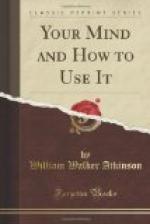In concluding our discussion of physical hygiene for the student, we cannot stress too much the value of relaxation. The life of a student is a trying one. It exercises chiefly the higher brain centres and keeps the organism keyed up to a high pitch. These centres become fatigued easily and ought to be rested occasionally. Therefore, the student should relax at intervals, and engage in something remote from study. To forget books for an entire week-end is often wisdom; to have a hobby or an avocation is also wise. A student must not forget that he is something more than an intellectual being. He is a physical organism and a social being, and the well-rounded life demands that all phases receive expression. We grant that it is wrong to exalt the physical and stunt the mental, but it is also wrong to develop the intellectual and neglect the physical. We must recognize with Browning that,
all good things
Are ours, nor soul helps flesh more, now,
than flesh helps soul.
READINGS AND EXERCISE
Readings:
Patrick (14) Chapters I, II and VII. Stiles (18) and (19).
Swift (20) Chapter X.
Exercise 1. With the help of a book on dietetics prepare an ideal day’s bill of fare for a student.
SUGGESTIONS FOR FURTHER READING
Besides the standard texts in general and educational psychology, the following books bear with especial intimacy upon the topics treated in this book:
1. Adams, John, Making the Most of One’s Mind, New York: George H. Doran Co., 1915.
2. Dearborn, George V., How to Learn Easily, Boston: Little, Brown & Co., 1918.
3. Dewey, John, How we Think, Boston: D.C. Heath & Co., 1910.
4. Dewey, John, Interest and Effort in Education, Boston: Houghton, Mifflin Co., 1913.
5. Fulton, Maurice (ed.), College Life, Its Conditions and Problems, The Macmillan Co., 1915.
6. Hall-Quest, Alfred L., Supervised Study, New York: The Macmillan Co., 1916.
7. Herrick, C. Judson, An Introduction to Neurology, Philadelphia: W.B. Saunders Co., 1915.
8. James, William, Talks to Teachers on Psychology, and to Students on Some of Life’s Ideals, New York. 1899.
9. James, William, The Energies of Men, New York: Moffatt, Yard & Co., 1917.
10. Kerfoot, John B., How to Read, Boston: Houghton, Mifflin & Co., 1916.
11. Lockwood, Francis (comp.), The Freshman and His College, Boston: D.C. Heath & Co., 1913.
12. Lowe, John Adams, Books and Libraries, Boston: The Boston Book Co., 1917.
13. McMurry, Frank M., How to Study, Boston: Houghton, Mifflin & Co., 1909.
14. Patrick, George T. W., The Psychology of Relaxation, Boston: Houghton, Mifflin & Co., 1916.
15. Sandwick, Richard L., How to Study and What to Study, Boston: D.C. Heath & Co., 1915.




